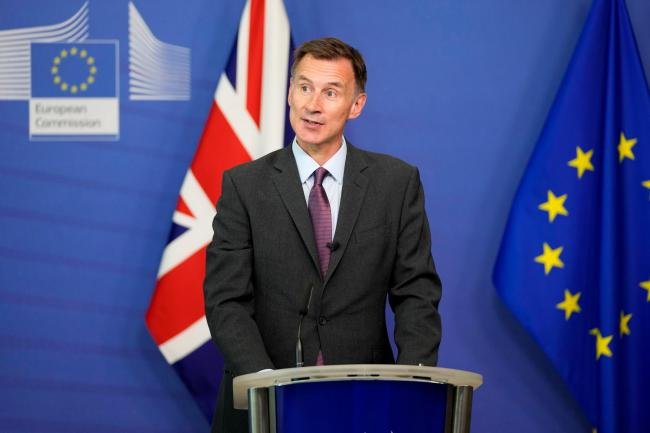The fact that the two sides were establishing a structured cooperation in the area of financial services, according to McGuinness, was “really positive.”

UK chancellor Jeremy Hunt denied on Tuesday that negotiations over London’s participation in the EU’s Horizon science programme have come to a standstill, stating that this would be the “optimal outcome.”
Speaking to reporters in Brussels, Hunt said negotiations over the specifics of the UK’s participation in the €95.5 billion programme were “becoming more crunchy” as the two parties sought to determine the specifics of how a deal would benefit British taxpayers.
When asked if discussions on Horizon were stalling during a press conference, Hunt responded, “I wouldn’t describe them as stalled. “Both sides acknowledge the success and significance of the Horizon Science Programme, and the ideal result would be to find a way where participation can benefit the UK.”
In a new sign of the two sides’ improving relations, he spoke as the UK and EU signed a deal on regulatory cooperation on financial services.
But leaders in science and business in the UK have warned that the country’s ambitions to become a science superpower are being harmed by the lengthy negotiations for British membership in Horizon.
One of the benefits of UK prime minister Rishi Sunak’s Brexit agreement with the EU in February, which ended a contentious dispute over trade policies in Northern Ireland, was the inclusion of re-joining Horizon. However, the two parties are still in negotiations over the EU’s scientific research programme.
Hunt is requesting a reduction in Britain’s Horizon participation fee. Due to the fact that its science programme runs from 2021 to 2027, the EU has offered to waive payments for two “lost” years.
In accordance with the EU-UK Trade and Cooperation Agreement, former British prime minister Boris Johnson reached a $2 billion per year agreement for associate membership in Horizon in 2020.
Margrethe Vestager, the EU commissioner in charge of research, and Hunt spoke about Horizon. According to officials, there had been no progress in the negotiations.
In an effort to put the animosity of recent years behind them, both the UK and the EU are making an effort to intensify their cooperation.
Hunt’s trip to Brussels marked the first by a British chancellor in more than three years and shows improved ties between the UK and EU following the adoption of the “Windsor framework,” which changed the trading conditions in Northern Ireland.
Hunt described the signing of the memorandum of understanding regarding regulatory cooperation as a “important turning point” in a joint statement with EU financial services commissioner Mairead McGuinness.
The fact that the two sides were establishing a structured cooperation in the area of financial services, according to McGuinness, was “really positive.”
The signing of the memorandum of understanding was a “significant milestone,” according to Chris Cummings, chief executive of the Investment Association, the trade association for the UK investment industry.
However, by itself, the new agreement won’t make it easier for UK financial services companies to access the EU market.
The only area in which the EU has temporarily granted the UK “equivalence” in terms of regulations following Brexit is clearing. It indicates that clearing houses in the City of London will continue to handle derivatives transactions denominated in the euro through the middle of 2025.
In response to the question of scientific collaboration, McGuinness stated that both parties were aware of the advantages of having a “shared area” around innovation. She continued, “I believe the goal is a shared one, and I would encourage more crunching so that we get a result.